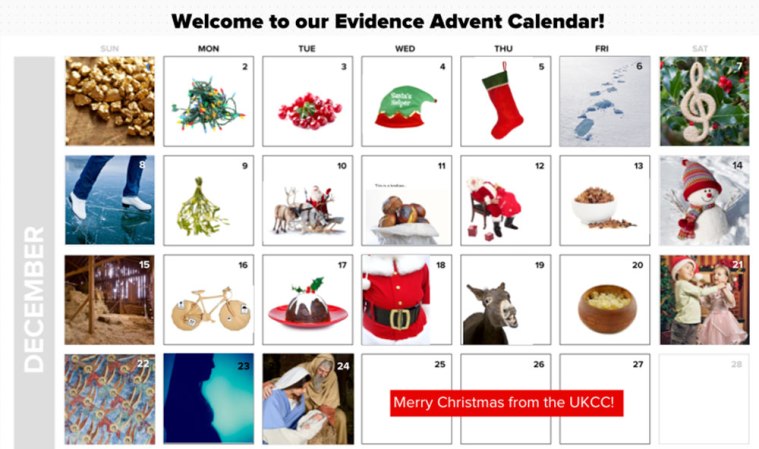Broken your New Year’s resolutions yet? Research from the US suggests just 8% of people achieve theirs and we know that if you’re hanging onto them into February you’re doing really well. When I thought about making a list of resolutions which clinical trialists and systematic reviewers might like to follow (the cheek of it!), it looked like a welcome distraction from deciding I’m going to take up running (again), eat only healthy snacks and get 10 hours sleep a night. But I find I am coming to this with a rising sense of sadness, disappointment and, well, outrage about some of the evidence gaps. Gaps which leave people struggling with health problems, and those trying to help them, without clear guidance on which interventions might help; and, indeed, on which may make things worse. Continue reading
Tag Archives: antibiotics
An evidence advent calendar!
It turns out that Cochrane’s for Christmas, not just for life, with evidence in the Cochrane Library on all manner of festive things from gold, frankincense and myrrh to stockings! Ok, some of the links are a bit tenuous, but we hope you’ll enjoy our advent calendar.
Owing to some trouble with the technology elves, we couldn’t make it interactive (boo!) but each day we’ll post some Cochrane evidence related to the day’s picture, below the calendar. If you think of any others, do share them via the comments box.

Flu, chills and other ills: a wintry round-up of Cochrane evidence
This week it really feels like winter is upon us and infection is the dominant theme in this blog, which gives you a round-up of some new and updated Cochrane reviews on flu vaccination; antibiotics for colds, sore throats and for those having feeding tubes put in; bringing down your poorly child’s temperature and whether avoiding lactose is helpful when diarrhoea strikes. Continue reading
A mystery, missing evidence and some answers!
Contrary to what you might expect, you’ll have to wait until the end for the mystery, though in truth missing data and important questions that remain unanswered could also be labelled as that, and this is where I start.
My last blog was a round-up of new and updated reviews on asthma and I begin this one with another offering from the Cochrane Airways Group (do these people never take a day off?). It’s another tale of what we still don’t know, this time about a class of anti-inflammatory drugs called anti-leukotrines. For managing mild persistent asthma in children, low-dose inhaled corticosteroids (ICS) are recommended, but if symptoms aren’t well controlled with ICS then anti-leukotrines may be added. Almost ten years ago, a Cochrane review was published which pulled together the available evidence on the safety and effectiveness of this treatment for adults and children and found very little to go on, with just two small trials with children. Now a review has been published which looked for trials involving children (any age below 18) and finds we’re not much further on.
Hot off the press: catch this Cochrane evidence!
If your idea of a present is a new or updated Cochrane review then it’s now Christmas every day with the arrival of Publish When Ready here in Cochraneland. In a huge change to the system for publishing reviews and protocols in the Cochrane Library, new arrivals appear daily, throughout the day, instead of once a month. In the time it takes me to make a cup of tea, a new review may have popped into the Library, ready for my consumption. It’s all rather exciting! It’s also rather alarming, as I have the distinct feeling that with such a rapid flow of evidence I may miss things and fail to shout about stuff that you might like to know about. It may calm down (or I may speed up!) but with the sudden arrival of a very large amount of new evidence I thought I’d give you a bit of a round-up. So here are my picks of the week on surgery, drugs and rock’n’roll, with some talking treatment thrown in. Continue reading
Taking antibiotics? Probiotics can cut your risk of diarrhoea
Key message: moderate quality evidence suggests that probiotics are both safe and effective for preventing Clostridium difficile-associated diarrhoea.
It’s no surprise that a new Cochrane review made headline news on the BBC’s health pages last week and was featured in many other health news reports too, as its focus was the use of probiotics to prevent Clostridium difficile-associated diarrhoea (CDAD) in people taking antibiotics. Continue reading
New evidence on antibiotics for exacerbations of chronic obstructive pulmonary disease – with some bits missing
Key message: Giving antibiotics to people admitted to the Intensive Care Unit (ICU) with severe exacerbations of COPD showed large and consistent benefits. Evidence relating to the use of antibiotics for people with moderate or mild exacerbations is inconsistent and there is continued uncertainty about whether antibiotics benefit those who can be treated as outpatients. Continue reading
Can signs and symptoms guide diagnosis and treatment of community-acquired pneumonia in children? A new Cochrane diagnostic accuracy review
| Key message: M. pneumoniae cannot be diagnosed reliably in children and adolescents with community-acquired pneumonia based on individual clinical symptoms and signs. Although absence of wheeze is a statistically significant diagnostic indicator, it does not have sufficient diagnostic value to guide empirical macrolide treatment. Chest pain may be a clinically useful indicator but needs further evaluation. |

